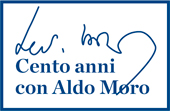When, in 1934, his family moved to Bari, he enrolled in the Law faculty and joined the local FUCI, where archbishop Marcello Mimmi had entrusted the Dominican friars with religious assistance. Their teaching had a theological rather than philosophical approach to Thomism, and was characterized by a rationalism not antithetic with the contemporary thought: such ideas are to be found in Aldo Moro’s religious and philosophical ideas.
In 1937, during the university, Moro took part in the contest Littoriali della cultura in Naples, as a member of the GUF of Bari. The following year he took part in the Littoriali in Palermo.
In the slow growth of the political and ideal climate within the Catholic association world – albeit this world was within the Fascist political horizon, some of its features could not be compared to the Fascist political thought – Moro had a quick career: in 1937 he was appointed president of the Bari circle, and he was FUCI national president from 1939 to 1941.
